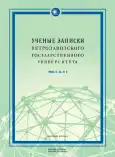ЭВОЛЮЦИЯ ПОНЯТИЙНЫХ ПРИЗНАКОВ КОНЦЕПТА ПОБЕДА В XVIII–XIX ВЕКАХ
- Авторы: БОДРИКОВ А.Б.1
-
Учреждения:
- ЧОУ ВО Институт иностранных языков
- Выпуск: Том 45, № 4 (2023)
- Страницы: 21-28
- Раздел: РУССКИЙ ЯЗЫК. ЯЗЫКИ НАРОДОВ РОССИИ
- URL: https://journal-vniispk.ru/2542-1077/article/view/295378
- DOI: https://doi.org/10.15393/uchz.art.2023.902
- EDN: https://elibrary.ru/AJPYSP
- ID: 295378
Цитировать
Полный текст
Аннотация
Цель исследования – описать понятийные признаки концепта победа периода XVIII–XIX веков. Задачи: проанализировать словарные статьи «победа» и других репрезентантов концептав толковых словарях русского и церковнославянского языков; на основе полученных данных опре-делить развитие понятийных признаков концепта победа. Актуальность исследования состоит в ос-мыслении эволюции первичных признаков изучаемого концепта до класса понятийных. В научнойлитературе отсутствуют работы, в которых анализируются понятийные признаки концепта победапериода XVIII–XIX веков. Этим объясняется научная новизна проведенного исследования. В ходеанализа пяти словарей данного периода было выявлено 42 понятийных признака концепта победа.Десять признаков, не обнаруженные в словарях периода XVIII–XIX веков, оказались актуальнымидля изучаемого периода. Это подтвердили данные из Национального корпуса русского языка. Общееколичество понятийных признаков изучаемого периода составило 52 единицы.
Ключевые слова
Об авторах
АЛЕКСЕЙ БОРИСОВИЧ БОДРИКОВ
ЧОУ ВО Институт иностранных языков
Автор, ответственный за переписку.
Email: bodrik1987@yandex.ru
кандидат филологических наук
Список литературы
Дополнительные файлы








